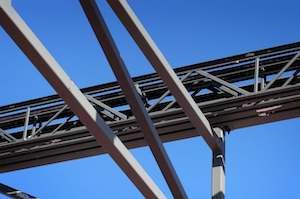Material prices, demand increase Q1 construction costs
Rising material prices and relentless demand for housing have combined to increase construction costs across the board.
 Statistics Canada’s latest look at building construction prices, for the first quarter of 2021, shows an increase of 5.6 percent for residential construction—the largest increase since the data series began in 2017. Non-residential building construction prices, meanwhile, rose by 1.5 percent, led mostly by higher construction costs for factories and warehouses.
Statistics Canada’s latest look at building construction prices, for the first quarter of 2021, shows an increase of 5.6 percent for residential construction—the largest increase since the data series began in 2017. Non-residential building construction prices, meanwhile, rose by 1.5 percent, led mostly by higher construction costs for factories and warehouses.
Construction costs rose for every building type in the first quarter, ranging from a 1.2 percent-increase for office buildings, to a 6.9-percent gain for townhouses, and a gain of 6.8 percent for single-detached houses.
The higher construction costs were mostly driven by a shortage of construction materials. In March, the prices of softwood lumber rose by nearly 12 percent while the price of plywood rose by more than 20 percent.
At nearly 119 percent, softwood lumber prices rose at their fastest year-over-year pace on record in March, partially because of low stocks following the temporary shutdown of sawmills during the first wave of the COVID-19 pandemic.
The surge in residential construction costs was also spurred by historically low interest rates and a desire for more living space during the pandemic. Investment in residential construction continued to rise, mostly driven by the growth of single-family home construction. Residential construction investments have been reached consecutive record levels since September 2020, and stood at a new high of $12.3 billion in February.
In Toronto, for example, residential construction costs were up 7.2 percent overall, led by a 9.0 percent price increase to build single-detached houses.
Non-residential building construction costs rose at the fastest pace for factories (+2.1 percent) and warehouses (+1.8 percent) in the first quarter. Warehouse space is at a premium in the wake of retail e-commerce sales increasing 92.0 percent year over year in February, following a 116.8 percent surge in January.
Non-residential building costs were up in every city covered by the survey, with prices rising at the fastest pace in Ottawa (+2.4 percent) and Montréal (+2.0 percent), mostly because of warehouses and factories.
Residential building construction costs rose at a record year-over-year pace of 11.7 percent in the first quarter, mostly because of limited supply and increased demand for building materials. Costs rose at the fastest pace in Calgary (+16.8 percent), Toronto (+15.0 percent) and Ottawa (+14.6 percent) in the first quarter.
Non-residential building construction costs rose 2.1 percent year over year, led by Ottawa (+4.9 percent) and Montréal (+4.4 percent).








